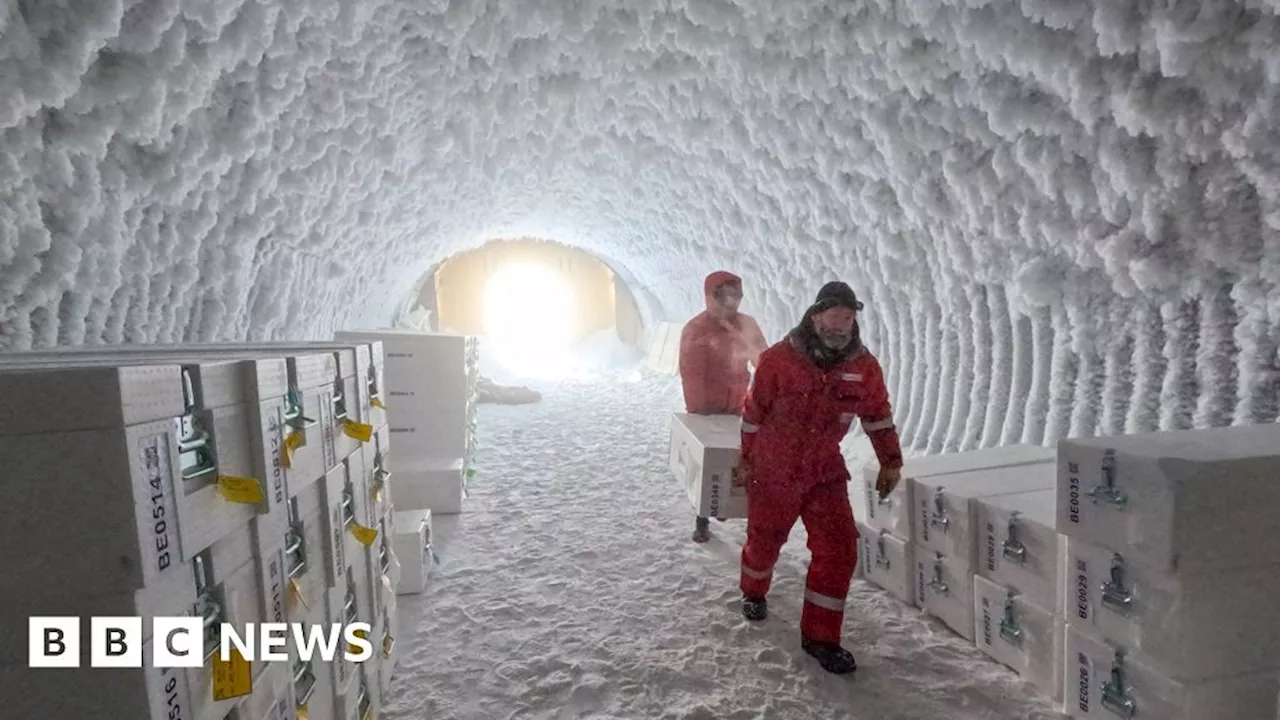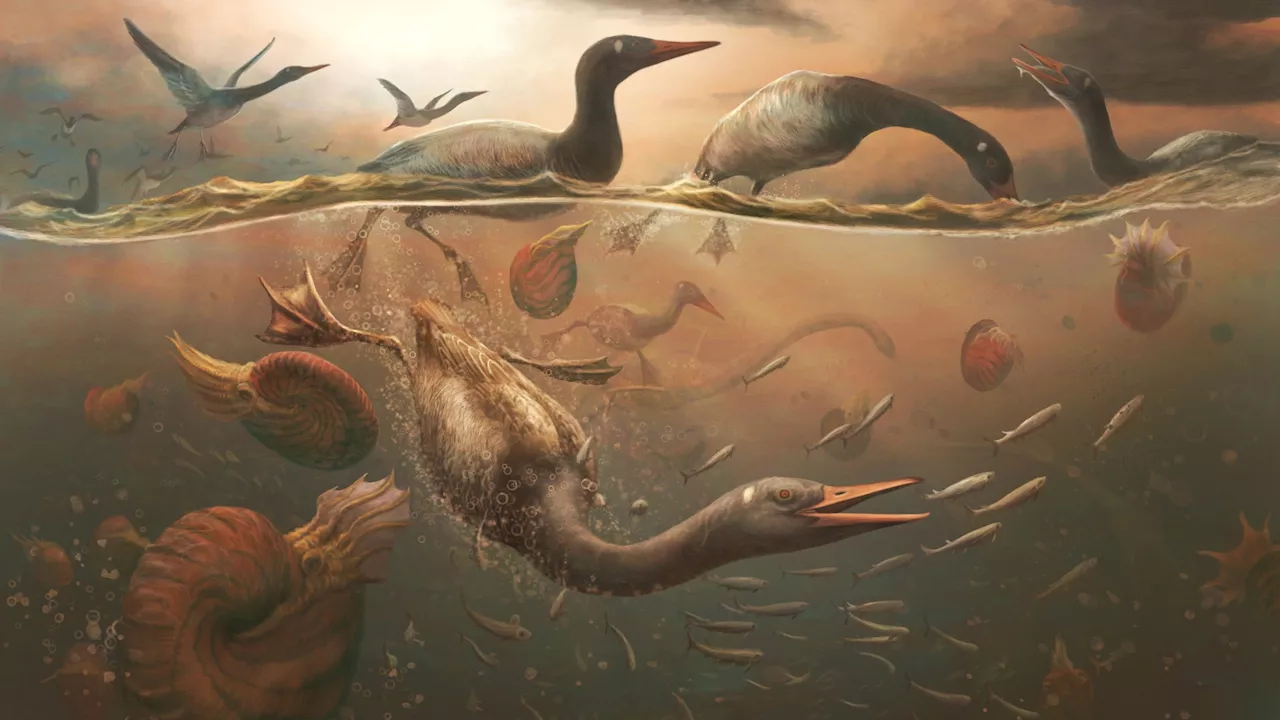A new study reveals the discovery of Vegavis iahei, a feathered creature from the Cretaceous period, as a potential ancestor of modern ducks and geese. The fossil, found in Antarctica, provides insights into the early evolution of birds and their diversification in the Southern Hemisphere.
A recently discovered ancient bird, Vegavis iahei, has been identified as a potential ancestor of modern ducks and geese. This feathered creature thrived during the Cretaceous period, surviving even the catastrophic asteroid impact that marked the end of the dinosaur era 66 million years ago. Vegavis ' discovery sheds light on the early evolution of birds, particularly their diversification in the Southern Hemisphere.
The fossil, unearthed in Antarctica as part of the Antarctic Peninsula Paleontology Project, is considered one of the earliest modern birds, according to a study published in Nature. Analysis of its bones suggests it inhabited the shallow waters off the coast of present-day Antarctica, using its feet to swim and catch fish. Its long, pointed beak and brain structure resemble those of modern birds, further supporting the theory that it is a direct ancestor of ducks and geese.The discovery of Vegavis challenges previous assumptions about the early evolution of birds. For decades, paleontologists have debated its status as a direct ancestor due to its distinct skull structure compared to other Mesozoic-era birds. However, this new research provides compelling evidence to solidify Vegavis' position as a key link in the avian family tree. Furthermore, the study highlights the significance of Antarctica in understanding the early stages of modern bird evolution.While other regions, like Madagascar and Argentina, yielded fossils of bizarre, tooth-bearing birds with long tails, Antarctica housed a unique lineage that diverged significantly. This suggests that Antarctica, with its warm and lush environment before its icy transformation, served as a haven for early bird diversification, ultimately leading to the ancestors of the waterfowl we know and love today
Vegavis Ancient Birds Duck Goose Antarctica Cretaceous Period Fossil Evolution
United Kingdom Latest News, United Kingdom Headlines
Similar News:You can also read news stories similar to this one that we have collected from other news sources.
 Lost Phone, Lost Hope: Airlines Fail in Phone Recovery ExperimentA Which? investigation found that less than half of lost phones on flights are returned to their owners. The experiment involved deliberately leaving phones on flights with major UK airlines, highlighting the poor systems in place for recovering lost items.
Lost Phone, Lost Hope: Airlines Fail in Phone Recovery ExperimentA Which? investigation found that less than half of lost phones on flights are returned to their owners. The experiment involved deliberately leaving phones on flights with major UK airlines, highlighting the poor systems in place for recovering lost items.
Read more »
 The reason all blue-eyed people share the same ancestorBlue eyes have captivated humans for centuries - but how did this rare eye colour come about, and why are people with blue eyes so rare?
The reason all blue-eyed people share the same ancestorBlue eyes have captivated humans for centuries - but how did this rare eye colour come about, and why are people with blue eyes so rare?
Read more »
 The Single Ancestor of All Blue-Eyed PeopleA groundbreaking genetic study traced the origin of blue eyes to a single ancestor living near the Black Sea about 10,000 years ago. The mutation responsible for this eye color is found in over 99.5% of blue-eyed individuals, highlighting a remarkable genetic connection.
The Single Ancestor of All Blue-Eyed PeopleA groundbreaking genetic study traced the origin of blue eyes to a single ancestor living near the Black Sea about 10,000 years ago. The mutation responsible for this eye color is found in over 99.5% of blue-eyed individuals, highlighting a remarkable genetic connection.
Read more »
 World's Oldest Ice Core, Dating Back 1.2 Million Years, Extracted from AntarcticaScientists in Antarctica have extracted a 2.8km-long ice core, believed to be the oldest in the world, dating back 1.2 million years. This ancient ice contains air bubbles and particles that scientists hope will shed light on major climate shifts during that period, particularly the Mid-Pleistocene Transition when glacial cycles changed drastically.
World's Oldest Ice Core, Dating Back 1.2 Million Years, Extracted from AntarcticaScientists in Antarctica have extracted a 2.8km-long ice core, believed to be the oldest in the world, dating back 1.2 million years. This ancient ice contains air bubbles and particles that scientists hope will shed light on major climate shifts during that period, particularly the Mid-Pleistocene Transition when glacial cycles changed drastically.
Read more »
 Mighty Ducks star Shaun Weiss reveals girlfriend suffered miscarriage after announcing pregnancy on...'No Intervention Yet' Mighty Ducks star Shaun Herman Weiss deeply concerns his fans about possible drug relapse in this frantic and worrisome video uploaded to his Instagram account.
Mighty Ducks star Shaun Weiss reveals girlfriend suffered miscarriage after announcing pregnancy on...'No Intervention Yet' Mighty Ducks star Shaun Herman Weiss deeply concerns his fans about possible drug relapse in this frantic and worrisome video uploaded to his Instagram account.
Read more »
 Google Earth sleuth thinks they've found a face in AntarcticaA Reddit user believes they've found what appears to be a face on a Google Earth image from Antarctica.
Google Earth sleuth thinks they've found a face in AntarcticaA Reddit user believes they've found what appears to be a face on a Google Earth image from Antarctica.
Read more »
